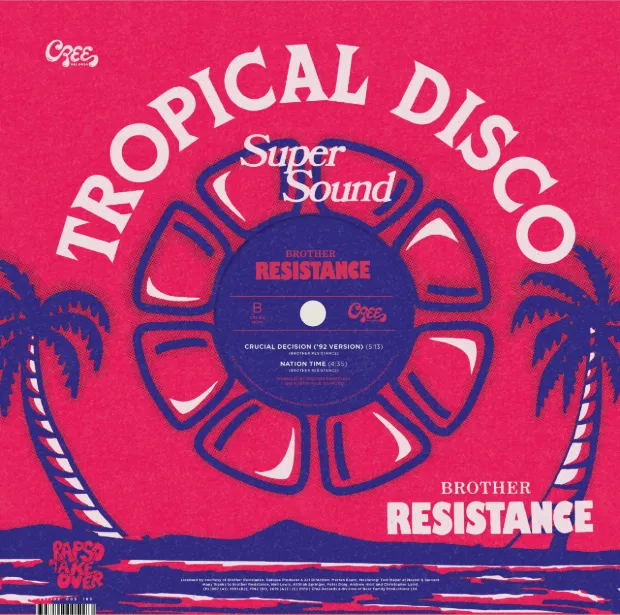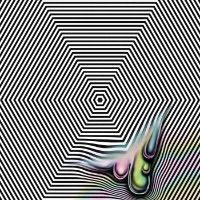- 12inch
- Recommended =
- New Release
Brother Resistance
Tonite Is De Night
Cree
- Cat No: CRS518
- updated:2019-06-02
発掘が進むカリビアンサウンド。カリプソ、ソカとポエトリー、ラップ。RAPSOと呼ばれたスタイルの音楽をやっていたトリニダッド・トバコのBROTHER RESISTANCEのレア音源をCREE RECORDSがコンパイル。カリビアン・ダブ!
Four 1986 in demand dancefloor bangers from Trinidad & Tobago’s father of Rapso. Incl a unreleased dub version of ''Rapso Space'' and the BIG tune ''Crucial Descosion''..
Out of the social unrest and revolutionary times of the early 1970s a new musical art form emerged on the streets of Port of Spain,
Trinidad & Tobago. A group of young guys started to combine poetry with drumming and created the musical art form that is known
today as Rapso.
Poets known as much for their fiery verses as they were for leading protests were at the vanguard of the 1970s Black Power
revolution. There was a new consciousness building in the Trinidad and Tobago arts scene. The two most influential characters were
Cheryl Byron and Lancelot Layne.
Lutalo ‘Brother Resistance’ Masimba and others would play basketball during the day and come back out at night, ‘liming’ and playing
drums. Other people from the block would join with instruments and Brother Resistance would perform his poetry on the rhythms. The
prestigious boys school that Resistance attended refused to acknowledge his attempts at creating verses that reflected the rhythm of
the Trinidad and Tobago creole. ''They said it wasn't poetry. They didn't want to put it in the school magazine.''
Resistance and his friends toyed with other words to describe their style. They came up with 'rapsody' but one night during a show in
Santa Cruz somebody in the audience shouted out ''How you could rap so!'' And the rest is history.
They recorded their first album ‘Bustin Out’ in 1980. More albums followed and they started to work as producers. In 1986 the band
performed at ‘Caribbean Focus’ festival in London and toured the U.K. which helped to lift their reputation internationally. The same
year Brother Resistance decided to produce his first solo album and went to England to record ‘Rapso Take Over’. This album
contains the highly acclaimed tracks Ring De Bell, Dancing Shoes Rapso and Star Wars Rapso. An unreleased take of Wars In
Rapso is featured on this Cree Records 12''.
The band wasn’t too impressed with the ‘English’ production and they decided to record a new version of the song. Junior Wharwood
recorded the guitar tracks. Resistance came up with the idea of Tonight Is De Night. The more or less improvised song became a big
carnival hit in Trinidad and he went to perform it live with bands like Sound Revolution, Shandileer and Charlie’s Roots.
Out of the social unrest and revolutionary times of the early 1970s a new musical art form emerged on the streets of Port of Spain,
Trinidad & Tobago. A group of young guys started to combine poetry with drumming and created the musical art form that is known
today as Rapso.
Poets known as much for their fiery verses as they were for leading protests were at the vanguard of the 1970s Black Power
revolution. There was a new consciousness building in the Trinidad and Tobago arts scene. The two most influential characters were
Cheryl Byron and Lancelot Layne.
Lutalo ‘Brother Resistance’ Masimba and others would play basketball during the day and come back out at night, ‘liming’ and playing
drums. Other people from the block would join with instruments and Brother Resistance would perform his poetry on the rhythms. The
prestigious boys school that Resistance attended refused to acknowledge his attempts at creating verses that reflected the rhythm of
the Trinidad and Tobago creole. ''They said it wasn't poetry. They didn't want to put it in the school magazine.''
Resistance and his friends toyed with other words to describe their style. They came up with 'rapsody' but one night during a show in
Santa Cruz somebody in the audience shouted out ''How you could rap so!'' And the rest is history.
They recorded their first album ‘Bustin Out’ in 1980. More albums followed and they started to work as producers. In 1986 the band
performed at ‘Caribbean Focus’ festival in London and toured the U.K. which helped to lift their reputation internationally. The same
year Brother Resistance decided to produce his first solo album and went to England to record ‘Rapso Take Over’. This album
contains the highly acclaimed tracks Ring De Bell, Dancing Shoes Rapso and Star Wars Rapso. An unreleased take of Wars In
Rapso is featured on this Cree Records 12''.
The band wasn’t too impressed with the ‘English’ production and they decided to record a new version of the song. Junior Wharwood
recorded the guitar tracks. Resistance came up with the idea of Tonight Is De Night. The more or less improvised song became a big
carnival hit in Trinidad and he went to perform it live with bands like Sound Revolution, Shandileer and Charlie’s Roots.




トリニダッド・トバコの70年代の市民権運動、ブラック・パワー運動を背景に、政府から危険分子とみなされ、警察にスタジオを破壊されたこともあるBROTHER RESISTANCE。〈LEFT EAR〉からの再発「Rapso Take Over」に続いて、96年のCDオンリーでリリースされていた「Tonight Is De Night」。未発表音源のレゲエディスコなダブ・セッション「Rapso Space Dub」、ラテン・フリースタイル的な感じもあるシンセサイザー・マシーンビートのソカ「Crucial Decision」sample3も是非チェックを。93年の「Nation Time」。 (サイトウ)